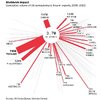.455_Hunter
Member
Announced today- 90 day ban on export of US arms and ammo to civilian and unapproved military destinations.

 www.reuters.com
www.reuters.com
The Commerce Department did not provide further details for the pause, which also includes shotguns and optical sights, but said an urgent review will assess the "risk of firearms being diverted to entities or activities that promote regional instability, violate human rights, or fuel criminal activities."

US halts exports of most civilian firearms for 90 days
The 90-day pause applies to all non-governmental users, due to national security and foreign policy interests.
The Commerce Department did not provide further details for the pause, which also includes shotguns and optical sights, but said an urgent review will assess the "risk of firearms being diverted to entities or activities that promote regional instability, violate human rights, or fuel criminal activities."



